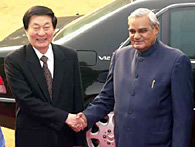 Visiting Chinese Premier Zhu Rongji and Indian Prime Minister Atal Bihari Vajpayee on Monday held talks and extensively exchanged views on bilateral relations and issues of mutual concern in New Delhi. Chinese government is willing to build a Constructive Partnership with India based on the Five Principles of Peaceful Co-existence, Zhu said.
Visiting Chinese Premier Zhu Rongji and Indian Prime Minister Atal Bihari Vajpayee on Monday held talks and extensively exchanged views on bilateral relations and issues of mutual concern in New Delhi. Chinese government is willing to build a Constructive Partnership with India based on the Five Principles of Peaceful Co-existence, Zhu said.
India and China are now engaged in modernization construction and both need peace and stability, Vajpayee told the Chinese premier, the first to visit India in 11 years.
India has attached great importance to its relations with China and is willing to develop country-to-country cooperation on the basis of the Five Principles of Peaceful Co-existence, Vajpayee added.
Congratulating India on its economic achievements in recent years, Zhu said that the purpose of his visit was to consolidate friendship, increase trust and expand cooperation between the two countries.
China and India have broad common ground and enormous cooperation potential, and the Chinese government is willing to build a Constructive Partnership with India based on the Five Principles of Peaceful Co-existence, Zhu said.
There are more common ground than differences and more interests than contradictions between China and India, and the Chinese side is full of confidence on the prospects of the Sino-Indian relationship, he added.
Stressing the importance of maintaining exchange of high-level visits and exchanges in various fields for the purpose of increasing mutual understanding, Zhu extended an invitation to Prime Minister Vajpayee to visit China in due time.
The Chinese premier also announced that in order to facilitate personnel exchanges between the two sides, the Chinese side has decided to open a regular flight from Beijing to Delhi from late March this year. China also welcomes India Airlines to start flights to China at an early date, he said.
The Chinese premier, who had brought many Chinese entrepreneurs and business people with him, also expressed the hope that the two countries could strengthen mutually-beneficial cooperation in trade and economic fields.
With China's access to the World Trade Organization, the Chinese market would be further opened to Indian businesses, the premier promised.
Zhu also talked about the necessity to increase bilateral exchanges and cooperation in the field of science and technology and to further promote regional economic cooperation.
On how to properly address certain problems that remained in bilateral relations, the Chinese premier said that after years of efforts, both sides had reached consensus on the important principle of "mutual understanding, accommodation and adjustment" and had signed two important agreements on maintaining peace and tranquility and taking confidence-building measures along the Line of Actual Control in the border areas.
The Chinese side is willing to fulfill these two agreements along with the Indian side and speed up the process of clarifying and confirming the Line of Actual Control, he added.
Vajpayee responded that India hopes to establish dialogue mechanism with the Chinese side in various fields and also expects the annual consultation of the Joint Work Group on the border issue to continue.
India hopes to resolve its differences with China on the border issue in a just, reasonable and mutually-acceptable way, said the prime minister.
The two leaders also discussed regional and international situation including the anti-terrorism issue.
The speech by Pakistan President Pervez Musharraf on January 12 has displayed Pakistan's resolve to crack down on terrorism, to which the Indian side has also made response, and the "positive attitude" of both countries should be welcomed, Zhu said.
As the neighbor of both India and Pakistan, China hopes both sides could settle their differences through consultations and by peaceful means, which is not only in the interest of both peoples, but also conducive to peace and development in South Asia.
Vajpayee introduced India's stand to Zhu and said that in order to achieve national development and improve the people's living standards, what India needs is peace.
The two leaders also agreed in their talks to establish an anti-terrorism dialogue mechanism between the two sides.
(People?s Daily January 15, 2002)
